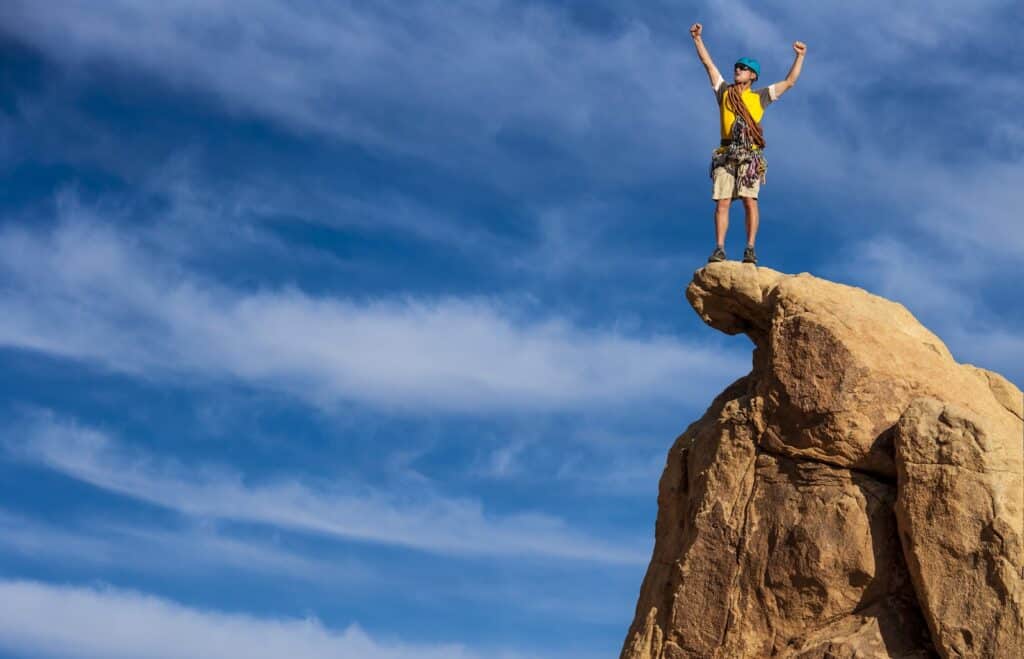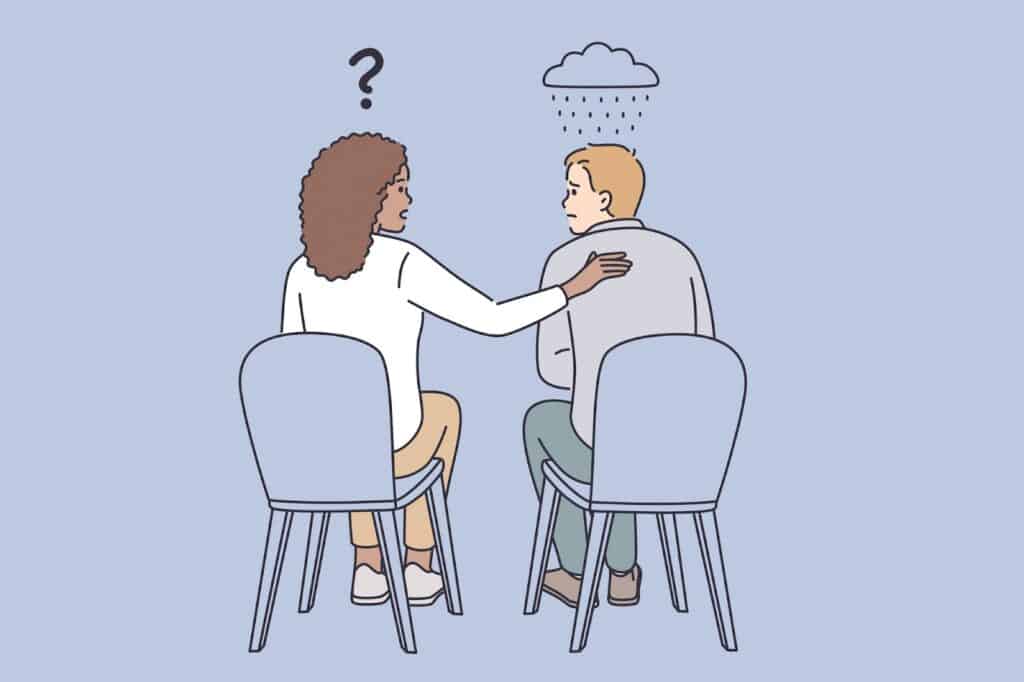
Some of the world’s greatest thinkers and artists, from Michelangelo to Maya Angelou, often sought solitude to ignite their creativity. The concept of doing things alone, far from being a sign of isolation, can be a gateway to self-discovery and personal growth. Why do we often judge the act of being alone as a negative state, when it can be a canvas for self-expression and learning?
Here, we probe into the art of learning to do things alone, revealing how this seemingly simple act can liberate us, and transform our understanding of ourselves and the world around us when we decide to go it alone.
Let’s start by uncovering why many find the idea of spending time alone so terrifying.
Why We Find It Hard to Do Things Alone
We live in a world where we’re constantly bombarded by the social stigma message that we should be social and connected. As a result, we often feel pressured to conform to these norms and find it difficult to step outside of our comfort zones to try new things alone. But have you ever stopped to consider that these societal norms might be limiting our true potential? In fact, it’s important to educate ourselves on the benefits of independence and self-reliance, so that we can break free from the constraints of what society expects of us.
Fear of loneliness and judgment
When we think about doing things alone, we often equate it with being lonely. However, there’s a significant difference between loneliness and solitude. Loneliness is a negative emotional state, while solitude is an opportunity for personal growth, reflection, and rejuvenation.
It’s natural to fear judgment from others when we venture out on our own. But why should the opinions of others hold us back from discovering our own strengths and capabilities? It’s time to overcome our fear of independence and embrace the beauty of solitude.
Overreliance on external validation
Given a social media-driven society, we’re constantly seeking likes, shares, and comments as a measure of our self-worth. This overreliance on external validation can make it challenging to do things alone, as we fear that our actions won’t be “good enough” without the approval of others.
But is it really worth sacrificing our personal growth and happiness for the sake of fitting in? By learning to improve our independence and self-confidence, we can break free from the need for external validation and start living life on our own terms.
Is It Normal to Want to Do Things Alone?
Yes, it is perfectly normal to want to do things alone. This preference for solitude can stem from various personal reasons and is a natural part of individual differences in personality and interests. People often seek alone time for relaxation, introspection, creativity, or simply as a way to enjoy their own company without the social demands of being with others. Enjoying activities alone can also be a sign of independence and self-sufficiency.
It’s important to distinguish, however, between choosing solitude for positive reasons and isolating oneself due to social anxiety, fear, or depression. While it’s healthy to enjoy solo activities, persistent avoidance of social interaction might require attention.
Wanting to do things alone is a common and normal preference, as long as it is balanced with healthy social interactions and doesn’t stem from negative emotions or mental health concerns.

The Importance of Learning to Do Things Alone
While many of us relish the company of others, there’s a distinct charm in going solo. Learning to enjoy doing things alone can be one of the best things we do for ourselves. It not only liberates us from the fear of doing something alone but also allows us to see things from a unique perspective. Whether it’s overcoming social anxiety while eating alone or embarking on a solo trip, embracing solitude enables us to appreciate our own company.
Here’s why liking to do things alone is a fulfilling path to deeper self-understanding:
Improving self-confidence.
When was the last time you accomplished something on your own and felt a surge of pride and self-confidence? Doing things solo allows us to take full ownership of our achievements, fostering a sense of self-worth that can’t be matched by group efforts.
As we become more independent, we realize that we’re capable of handling challenges and overcoming obstacles on our own. This newfound self-confidence empowers us to take on bigger goals and dreams, leading to a life of greater fulfillment and success.
Fostering creativity and problem-solving skills.
Have you ever found yourself stuck in a rut, only to have a lightbulb moment when you’re alone with your thoughts? Solitude provides the space and freedom for our minds to wander, explore, and make connections that might not be possible in a group setting.
By doing things alone, we’re able to tap into our inner creativity and develop innovative solutions to problems. After all, some of history’s greatest minds, like Albert Einstein and Isaac Newton, made their groundbreaking discoveries while working independently.
Cultivating emotional resilience.
Life is full of ups and downs, and it’s crucial to develop the emotional resilience needed to navigate these challenges. By doing things alone, we’re forced to confront our emotions head-on and learn to manage them without relying on others for support. This emotional resilience allows us to bounce back from setbacks and maintain a positive outlook even in the face of adversity.
Furthermore, it equips us with the tools to build better relationships with others, as we’re less likely to rely on them for emotional validation.
Opportunities for self-discovery and personal growth.
When we venture out on our own, we’re given the opportunity to explore our own thoughts, desires, and passions. This process of self-discovery can lead to significant personal growth, helping us better understand ourselves and our place in the world.
By doing things alone, we can uncover hidden talents, develop new interests, and learn more about what truly makes us happy. In this way, solitude becomes a powerful catalyst for self-improvement and personal development.
Encouraging self-reliance and resilience.

Doing things alone forces us to rely on our own skills, resources, and abilities. This can be an empowering experience, as we develop a sense of self-reliance and resilience.
When we accomplish tasks independently, we prove to ourselves that we can overcome challenges and adapt to new situations. These valuable skills can be applied to various aspects of our lives, from our careers to our relationships, making us more capable and confident individuals.
Providing space for reflection and relaxation.
In our fast-paced, always-connected world, it’s important to carve out some time for ourselves. Solitude allows us to disconnect from the noise and distractions of daily life, creating space for reflection and relaxation.
This time alone can be a powerful tool for maintaining mental health, reducing stress, and fostering a sense of inner peace and balance.
Strengthening decision-making abilities.
When we do things alone, we’re solely responsible for making decisions and taking action. This can help sharpen our decision-making abilities, as we learn to trust our intuition and judgment.
By honing these skills, we become more self-assured in our choices, both in our personal lives and our professional pursuits.
Expanding our comfort zones.
Stepping out and doing things alone can be a daunting prospect, but it’s also an opportunity to expand our comfort zones. By embracing new experiences and facing our fears, we grow as individuals and become more adaptable to change.
This adaptability can serve us well in all areas of life, opening up new opportunities and experiences.
Cultivating a sense of independence.
Independence is a fundamental aspect of personal growth, and doing things alone helps us develop a sense of autonomy. As we become more independent, we gain the confidence to take control of our lives and make choices that align with our values and goals.
This sense of independence can lead to greater satisfaction and success in our personal and professional lives.
Developing empathy and compassion.

By spending time alone, we gain a better understanding of our own emotions and experiences. This heightened self-awareness can, in turn, lead to greater empathy and compassion for others, as we become more attuned to their feelings and perspectives.
This emotional intelligence is a valuable asset in building and maintaining strong, healthy relationships.
Tips for Learning to Do Things Alone
Now that we’ve recognized the importance of enjoying doing things solo, the next step is to figure out ways to get comfortable with it. Going solo doesn’t always come naturally; it’s a skill that can be cultivated with practice and mindset shifts. From managing social anxiety to finding joy in visiting places alone, this section provides practical tips and insights.
Whether you’re planning a solo trip or simply want to enjoy doing things alone in daily life, these strategies will guide you in liking and embracing your solo adventures.
Set clear, achievable goals for solo activities.
Before embarking on your solo journey, create a list of activities you want to accomplish independently. Apply the SMART (Specific, Measurable, Achievable, Relevant, and Time-bound) criteria to your goals.
This approach will help you establish a solid plan with realistic objectives, making it easier to monitor your progress and stay focused.
Embrace technology as a learning aid and companion.
As you learn to do things alone, tap into the wealth of resources available online. Use apps and websites for learning new skills, staying organized, and finding inspiration.
Additionally, consider using virtual assistants, such as Google Assistant or Siri, for hands-free help and companionship during your solo endeavors.
Cultivate self-motivation through rewards and milestones.

Keep yourself motivated by setting milestones for your solo activities. As you reach each milestone, reward yourself with something you enjoy, such as a special treat or a relaxing activity.
This positive reinforcement will help you maintain enthusiasm and drive throughout your journey toward independence.
Seek out online communities for support and advice.
Connect with others who share your interest in becoming more self-reliant by joining online forums, social media groups, or virtual meetups.
These communities can provide valuable support, advice, and camaraderie as you navigate the challenges of learning to do things alone.
Break tasks into smaller steps for easier progression.
When tackling large or complex tasks, break them down into smaller, more manageable steps. This technique helps prevent overwhelm and ensures a sense of accomplishment as you complete each step, ultimately leading to increased motivation and confidence.
Document your journey to track progress and inspire others.

Record your experiences, thoughts, and progress as you learn to do things alone. Use a journal, blog, or vlog to document your journey, providing both a personal record and a source of inspiration for others facing similar challenges.
Schedule regular alone time to develop independence.
Establish a routine that includes dedicated time for solo activities, whether it’s a weekly appointment with yourself or a specific time of day when you focus on independent pursuits.
Consistent alone time will help you create a habit of spending time alone and strengthen your sense of independence.
Develop problem-solving skills through independent research.
When confronted with challenges, be proactive in seeking solutions on your own. Conduct research, consult experts, and experiment with different approaches.
As you develop your problem-solving skills, you’ll gain confidence in your ability to tackle obstacles independently.
Pursue hobbies that naturally lend themselves to solitude.

Explore hobbies or activities that can be enjoyed alone, such as reading, writing, painting, or hiking. Engaging in these pursuits will help you become more comfortable with solitude and foster independence in a natural, enjoyable manner.
Practice mindfulness to foster self-awareness and resilience.
Incorporate mindfulness practices into your daily routine to cultivate self-awareness, resilience, and emotional well-being.
Techniques such as meditation, yoga, or deep breathing exercises can help you stay grounded, focused, and better equipped to handle the challenges that come with learning to do things alone.
Conclusion
Learning to do things alone can be a challenging process. There are many different ways to approach this task, but the most important thing is to find what works best for you. By incorporating some of these strategies into your daily routine, you can help yourself develop the skills needed to become more comfortable with solitude.
If you find that you are struggling with some of the strategies outlined above, consider experimenting with different ones to see which one works best for you. When learning how to do things alone, it’s important to remember that it’s okay if your first attempts at doing things by yourself don’t go perfectly. You will get better with time and practice.
As you finish reading about the nuances of doing something alone, consider this: when was the last time you truly enjoyed your own company without the static of the outside world? The ability to be alone, not just physically but mentally and emotionally, is a skill seldom discussed but widely beneficial. Can you challenge yourself to find joy and fulfillment in solitude, transforming ‘alone time’ into a powerful tool for personal growth and self-discovery?
FAQs
Q: How can I overcome feeling self-conscious when doing things alone in public?
A: To overcome feeling self-conscious when doing things alone in public, remember that being alone is completely normal and that everyone needs alone time. Focus on enjoying the activity and letting go of any self-conscious thoughts.
Q: What are some fun things I can do alone in public?
A: Some fun things you can do alone in public include going to the movies alone, going to a bar or restaurant alone, attending events or performances solo, or simply taking a leisurely walk in a park or city.
Q: Are there any ways to get instant enjoyment from doing things alone?
A: Yes, there are ways to get instant enjoyment from doing things alone. You can engage in activities that you truly enjoy, savor the moments without the distraction of others, and treat yourself to exactly what you want without compromise.
Q: How can I get to know myself better by embracing the art of doing things alone?
A: Embracing the art of doing things alone allows you to spend uninterrupted time with yourself, helping you to understand your own preferences, interests, and strengths. It can lead to a deeper self-awareness and self-discovery.
Q: How can doing things alone help me without the distraction of other people in my life?
A: Doing things alone can help you focus on your own thoughts, desires, and needs without the distraction of other people’s opinions or expectations. It provides an opportunity for self-care and self-discovery.
Q: What if I stopped doing things alone because I started feeling self-conscious?
A: If you stopped doing things alone because you started feeling self-conscious, remind yourself that being alone is a natural and healthy part of life. Take small steps to reintroduce solo activities and focus on enjoying the experience.
Q: Are there any benefits to going to the movies alone instead of with others?
A: Going to the movies alone gives you the freedom to choose the film you want to see without compromising with others. It also allows you to fully immerse yourself in the movie without any distractions, enhancing the overall experience.









